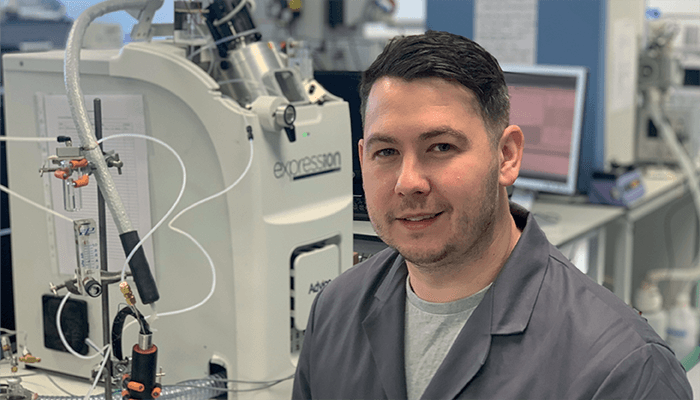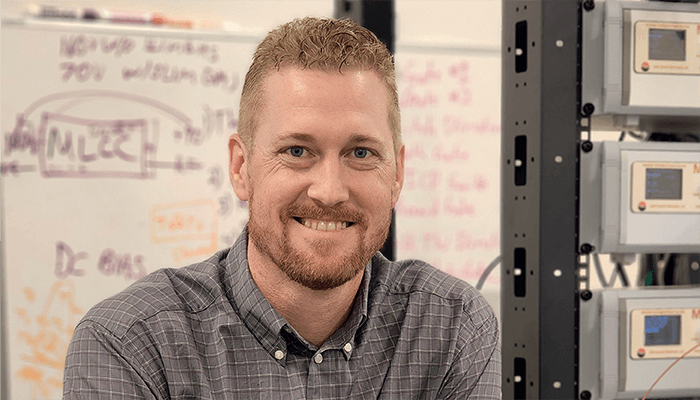Michael Marty
My biggest fear is that we are not attracting enough talented students into analytical graduate programs. Traditional analytical chemistry or quantitative analysis courses tend to start with topics that most students find boring like error propagation or statistics. These are undoubtedly important, but they don’t draw students in. When I started teaching our undergraduate analytical chemistry course, I flipped the curriculum so that we start with the analytical methods to solve key problems and then cover the statistics once they have some context for why they are important. So far, I think it gets the students more excited about analytical sciences as a discipline. As a field, we need to do more to encourage undergraduates to pursue careers and graduate degrees in analytical chemistry. Otherwise, we will find that there are not enough students to sustain vibrant graduate programs and not enough PhDs to meet the needs in industry and academics.
Georg Ramer
One area of concern – once we’ve attracted talented students – is effectively training and educating them. Modern analytical chemistry to a large part is instrumental analytical chemistry, which relies on the use of expensive, complex instruments. This has two implications: first, training analytical chemists is expensive and will be increasingly expensive; and second, complex instruments, especially those with a lot of automated data processing will more and more be treated like black boxes that are assumed to give “true” answers.
There have been some recent efforts to virtualize undergrad labs to overcome the issue of instrumentation cost. These efforts will no doubt be furthered by advances in virtual reality technology. However, though such approaches can certainly be effective in teaching the basics, they can’t currently mimic all the minutiae that go into making a correct analysis – and leave little room for creativity to go beyond the exact experiment the programmer had intended. We can address both issues – cost and complexity – by focusing on a thorough theoretical understanding of methods and fundamental working principles over cutting edge equipment in teaching. In fact, simple, robust instruments that hide little behind polished interfaces and automation are probably a good way to learn instrumental analytical chemistry. Such teaching instruments currently exist for some optical methods (Raman, UV/VIS), but not for many other common types of analytical instrumentation.
Liam Heaney
My biggest fears relate to the funding landscape. I have noticed an interest in moving the funding approach for mass spectrometry away from the individual lab setting and towards an approach where there are “mega labs” and national/regional facilities. Though these approaches might make sense to a funding agency (you can fill a lab with the best equipment and best scientists), the reality is that these setups will massively detract from the next generation of scientists’ capacity to learn. These “mega labs” will likely become too much of a service; students will visit for a few days to run their analysis and will not get the same level of learning. In reality, the majority of access will remain to those with the most well-funded projects, potentially creating an even wider divide in academic opportunities.

Daniel DeBord
One of the challenges, or perhaps decisions, we face as analytical scientists is the degree to which we choose to specialize in our respective areas of study. To achieve recognition and advancement in our fields we often need to reduce our scope of study to a very narrow range. This provides us with a depth of understanding such that we are able to effectively contribute to the ongoing research and communal knowledge of the field. The downside of this specialization is that we lose visibility and awareness of adjacent fields of study in the process. As we approach new problems and challenges in our research, we sometimes end up with a hammer looking for nails. The select few scientists who maintain bridges across various techniques or fields of study are in the minority, and yet it is this generalist approach to problems that has the best chance of providing a global optimum solution. We should always strive to balance our natural draw to go deeper in the knowledge of our individual fields with a drive to venture outside of our comfort zones and learn something new from a colleague.

Flavio A. Franchina
For me, it’s the “push and play” concern! The same features of accessibility and usability, resulting from the automation and easiness of use, which mark the evolution and establishment of a novel analytical technique, might lead people to think analytical science is easy; which could in turn lead young researchers to overlook the fundamentals…
Andrew Ault
Yes – as analytical instrumentation gets more powerful and complex, there will be fewer folks that understand what is happening within the black box. Every time we walk a trainee through the basic chemistry and physics going on within a complex instrument we help inoculate ourselves against this.
But my biggest fear is that, with so many amazing tools available, our ideas about what to study will be driven by the questions that are easiest to answer with the tools we have, rather than the questions that most need answering. Anytime we broaden our horizons and think about new tools or new ways to use tools we are taking steps to avoid that.
Lawrence Madikizela
Research productivity is assessed by one’s ability to publish and attain research funding. With the latter becoming more difficult, some researchers are attempting to publish poor quality research. As an editor and reviewer in various journals, I have seen a high number of research articles being declined based largely on a lack of novelty, poor experimental design, and poor quality of the research manuscript itself. Sadly, some reviewers and editors overlook these shortfalls, which result in the publication of mediocre work. I’m most worried about the impact this will have on younger researchers, who benchmark themselves against what has already been published. In some cases, they might even be reading research published by a predatory journal and using that to conceptualize future research ideas. In the long run, this will have severe consequences.
Ali Salehi-Reyhani
The lack of recognition of analytical measurement sciences can be a problem. Again, we have to make that case to our funders, the public, and to decision makers. It should be easy: measurements are the bedrock of science, and analytical science, be that new instrumentation or techniques, has invariably been at the heart of our greatest scientific achievements. But if I was to be pessimistic, analytical science either takes a back seat or is not mentioned outside its own circles.
Shane Ellis
We get a bad rap as a “boring” field – just titrations and routine analysis. But it’s so much more – and truly multidisciplinary, bringing together engineering, chemistry, physics, biology, and informatics. To attract more younger scientists, we need to communicate how fascinating and broad analytical chemistry can be, as well as the many career opportunities it can open up.





